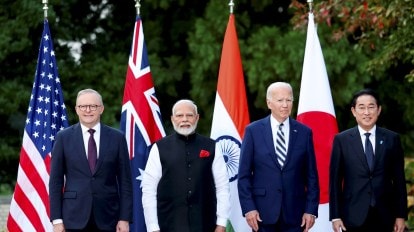Context:
The Quad countries—India, the United States, Australia, and Japan—launched the Quad Cancer Moonshot Initiative to reduce the burden of cancer in the Indo-Pacific region.
The Quad Cancer Moonshot Initiative
- Its aims to tackle Cervical Cancer by expanding screening, increasing vaccinations against the human papillomavirus (HPV), and improving patient treatment options and care in underserved areas.
- HPV is a common sexually transmitted infection that is the primary cause of cervical cancer; and treating patients.
- It will focus on innovative strategies to prevent, detect, and treat cancer, while also alleviating its impact on patients and their families.
Cervical Cancer
- Cervical cancer develops in a woman’s cervix (the entrance to the uterus from the vagina).
- Almost all cervical cancer cases (99%) are linked to infection with high-risk HPV, an extremely common virus transmitted through sexual contact.
- It is preventable through vaccination and treatable if detected early.
- India accounts for about a fifth of the global burden of cervical cancer, with 1.23 lakh cases and around 67,000 deaths per year.
- Cervical cancer is the third leading cause of cancer deaths among women in the Indo-Pacific region.
India’s Contribution to the Cancer Moonshot Initiative
- India is developing an AI-based treatment protocol for cancer, praising the initiative as a way to provide affordable and quality healthcare in the Indo-Pacific.
- India dedicated a grant of $7.5 million for cancer testing, screening, and diagnostics in the Indo-Pacific region.
- India will offer support for radiotherapy treatment and capacity building for cancer prevention in the region.
- India will supply 40 million doses of vaccines to Indo-Pacific countries through GAVI and QUAD programs.
- India will provide technical assistance for cancer screening and care as part of its $10 million contribution to the WHO’s Global Initiative on Digital Health.
India’s Efforts to Combat Cervical Cancer
- Cervavac: India’s first indigenously developed quadrivalent human papillomavirus (qHPV) vaccine for the prevention of cervical cancer.
- National Programme for Prevention and Control of Non-Communicable Diseases: This initiative increases population-based screening for cervical, oral, and breast cancers.
- Visual Inspection with Acetic Acid (VIA): This cost-effective and simple method is used for cervical cancer screening, helping to detect early signs of the disease.
- Pradhan Mantri Jan Arogya Yojana (PMJAY): This program aims to make cancer treatment more affordable for patients.
- In the Interim Budget 2024, Finance Minister Nirmala Sitharaman announced plans to encourage HPV vaccination for girls aged 9-14.

